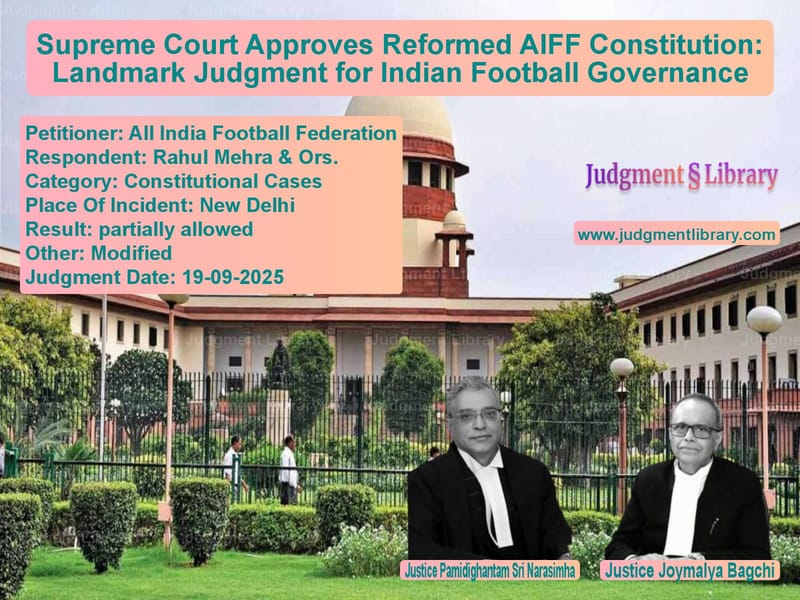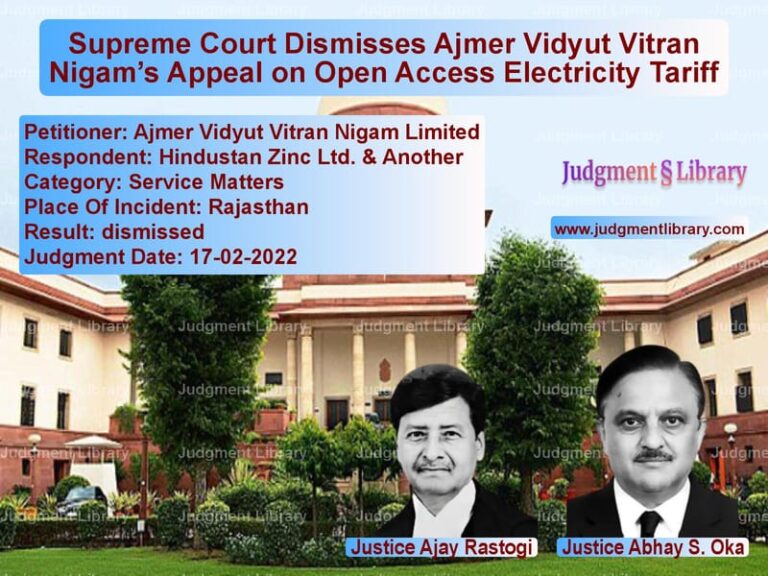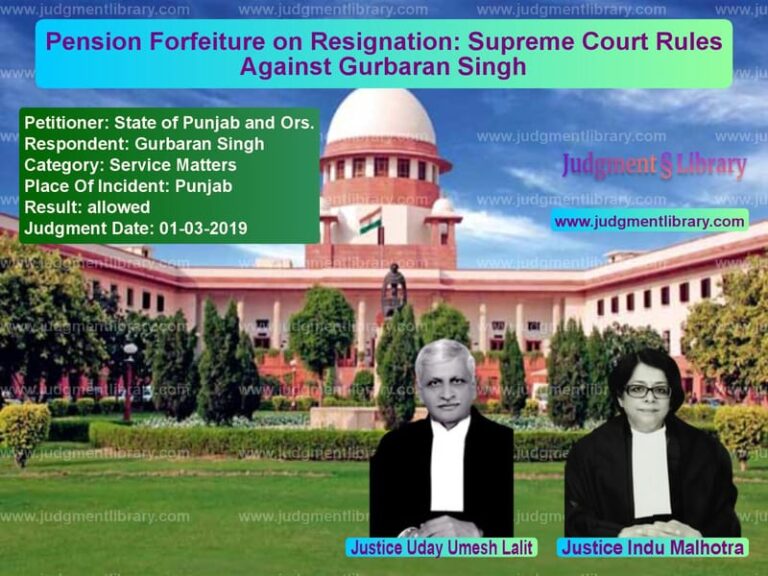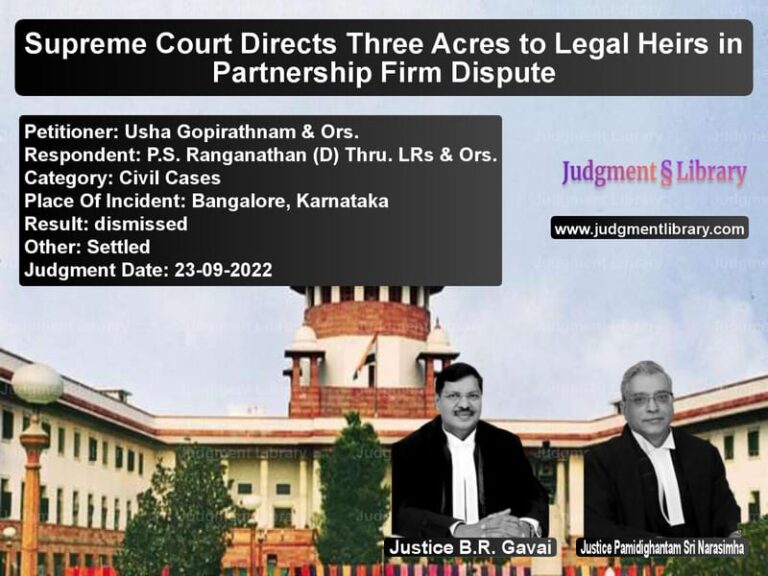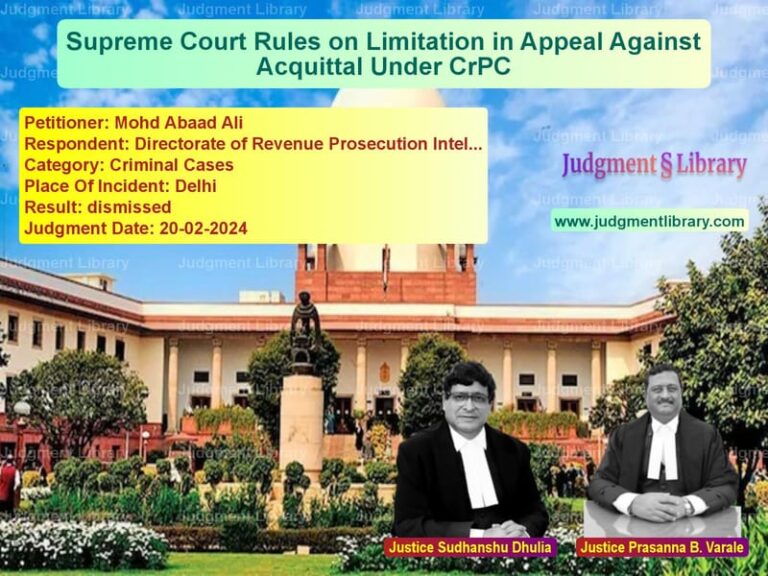Supreme Court Approves Reformed AIFF Constitution: Landmark Judgment for Indian Football Governance
In a landmark judgment that promises to transform the landscape of Indian football, the Supreme Court has approved a comprehensively reformed Constitution for the All India Football Federation (AIFF), marking a significant step toward professionalizing the sport’s administration in India. The judgment culminates an eight-year legal battle that exposed deep-rooted governance issues within the country’s football administration and sets the stage for a new era of transparency, accountability, and player representation in Indian football.
The case originated from a public interest litigation filed by Mr. Rahul Mehra in 2010, challenging the functioning of various sports federations, including the AIFF. The legal journey saw multiple twists and turns, including the appointment of a Committee of Administrators, suspension threats from FIFA, and extensive deliberations involving all stakeholders in Indian football. The Supreme Court’s final judgment addresses twelve critical issues that will define how football is administered in India for years to come.
The Court began by emphasizing the fundamental importance of sports in national life, observing that sporting facilities and opportunities are material resources of the community and their organizers are the institutions of the national life. The Court noted that it is high time we recognize that sporting facilities and opportunities are material resources of the community, and their organizers are the institutions of the national life. As places of public resort, sporting institutions and bodies must remain accessible, not just for pursuing sport, but also for its administration.
One of the most significant aspects of the reformed Constitution is the inclusion of eminent players in the General Body. The Court approved the provision allowing 15 eminent players with voting rights in the General Body, including at least five women players. This addresses the long-standing demand for greater player representation in football administration. The Court rejected arguments from state associations that opposed voting rights for players, noting that a harmonious reading of the National Sports Code provisions shows that clause 3.20 is essentially a carve-out from clauses 3.9 or 3.10, and grants voting rights to the class of persons indicated therein, i.e., prominent sportspersons of outstanding merit.
The Court also established eligibility criteria for eminent players, reducing the requirement to 5 international matches for men and 2 for women from the originally proposed 7 and 3 matches respectively. The Court observed that we either reduce the number of eminent players in the general body or reduce the criteria for qualifying as an eminent player. This issue needs to be resolved on the basis of the current position of the availability of past players.
On the contentious issue of disqualification criteria, the Court made several important modifications. Regarding disqualification based on criminal charges, the Court modified the provision to align with the BCCI standard, requiring conviction followed by a sentence of imprisonment rather than mere framing of charges. The Court noted that in view of the fact that the recommendations of the law commission of India have not adopted by legislature yet, and also in view of the fact that no relevant parallel has been brought to our notice regarding any other NSF’s Statutes containing such a provision, we are inclined to modify the provision of disqualification based on framing of charge.
The Court also modified the disqualification provision for public servants, restricting it to ministers and government servants rather than all public servants as defined under the Indian Penal Code. The Court reasoned that even if such a person is a public servant, if he or she has the necessary approval of the government, there should not be a problem under section 4(2)(e) of the newly enacted NGSA 2025.
Perhaps one of the most far-reaching aspects of the judgment is the extension of the AIFF Constitution’s provisions to state associations. The Court rejected arguments from state associations that they should be exempt from these governance reforms, emphasizing the pyramidical structure of Indian football. The Court observed that it is important to note that in view of the chequered history of Indian football administration, and also that governance of football undisputedly trickles down from the superstructure to the base, i.e., NSFs conform to FIFA, it is important that the state associations and local bodies conform to the NSFs.
The judgment also addresses the role of private entities in football administration, particularly concerning Football Sports Development Limited (FSDL), which operates the Indian Super League. The Court upheld provisions that prevent the AIFF from delegating essential functions to private parties, ensuring that the federation maintains control over core aspects of the sport. The Court noted that commercial exploitation of sports per se cannot be said to be detrimental to the interests of sport, but emphasized the need for boundaries.
On the crucial issue of promotion and relegation, the Court upheld the provision requiring the senior-most top division league to implement these principles. The Court recognized the importance of this system for healthy competition, noting that promotion and relegation add an additional dimension to league play that is not present in closed leagues. In order to avoid relegation, teams must play at the highest level all season long.
The Court also addressed the applicability of principles established in the BCCI case to football administration, rejecting arguments that these precedents shouldn’t apply to AIFF. The Court emphasized that this present exercise is primarily about football, but on a broader level, is also an exercise to instil professionalism, efficiency, and fairness in sports administration, which shall take Indian football to greater heights.
In a significant measure to protect the reforms, the Court approved a provision requiring that any amendments to the Constitution must receive the Supreme Court’s approval before taking effect. However, the Court clarified that continuous monitoring of a sports federation by any forum, including the Supreme Court is not appropriate. Having taken up the matter and ensured that the Constitution is brought to this stage, it is necessary to take it to its logical end. Our monitoring will only be that far and no further.
The judgment also establishes a minimum age of 25 years for candidates contesting elections and includes several other provisions to ensure transparency in elections, dispute resolution, and disciplinary processes. The Court directed that the AIFF administration call for a special general body meeting and adopt the draft Constitution with the modifications in this judgment within four weeks.
The Supreme Court’s comprehensive judgment represents a watershed moment for Indian football. By establishing a robust governance framework that emphasizes transparency, accountability, and player representation, while maintaining the federation’s autonomy within defined boundaries, the Court has laid the foundation for the systematic development of football in India. The reforms come at a crucial time when Indian football seeks to establish itself on the global stage, and the new Constitution provides the structural integrity needed to support this ambition. As the Court aptly noted, our country is brimming with promising sporting talent which seeks suitable avenues and organisational support. We need to channelise this talent efficiently – from village fields to international platforms.
Petitioner Name: All India Football Federation.Respondent Name: Rahul Mehra & Ors..Judgment By: Justice Pamidighantam Sri Narasimha, Justice Joymalya Bagchi.Place Of Incident: New Delhi.Judgment Date: 19-09-2025.Result: partially allowed.
Don’t miss out on the full details! Download the complete judgment in PDF format below and gain valuable insights instantly!
Download Judgment: all-india-football-f-vs-rahul-mehra-&-ors.-supreme-court-of-india-judgment-dated-19-09-2025.pdf
Directly Download Judgment: Directly download this Judgment
See all petitions in Public Interest Litigation
See all petitions in Constitution Interpretation
See all petitions in Fundamental Rights
See all petitions in Separation of Powers
See all petitions in Judgment by P.S. Narasimha
See all petitions in Judgment by Joymalya Bagchi
See all petitions in partially allowed
See all petitions in Modified
See all petitions in supreme court of India judgments September 2025
See all petitions in 2025 judgments
See all posts in Constitutional Cases Category
See all allowed petitions in Constitutional Cases Category
See all Dismissed petitions in Constitutional Cases Category
See all partially allowed petitions in Constitutional Cases Category

